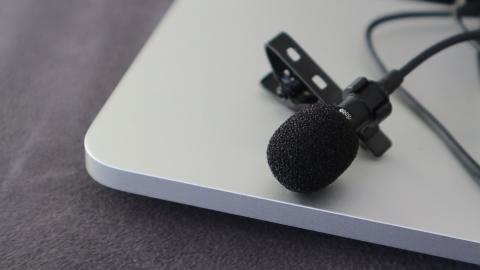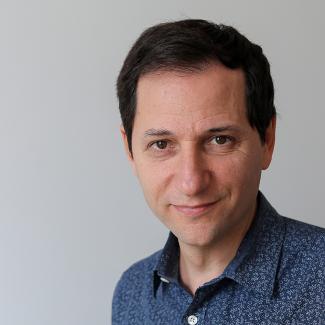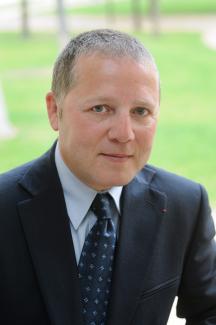
Covid-19 and lockdown: researchers, doctors and lecturers, etc. speak out in a time of crisis
The Covid-19 pandemic, which is currently raging, has disrupted all aspects of our daily lives and is impacting on current events and scientific and ethical issues in many fields. As a result, scientists at Université Paris-Saclay, whether they are economists, virologists, physicists or doctors, have been asked to give their views in their fields of expertise. Here is an overview of their appearances in the media.
Julien Bobroff encourages new forms of outreach since lockdown
Accustomed to outreach events, Julien Bobroff, a physics professor at the Laboratoire de physique des solides (Solid-state Physics Laboratory) (LPS - Université Paris-Saclay, CNRS) and member of the “Physics Done Differentlyˮ team has had to cross off all such activities from his agenda. This has been no problem, however. From his living room, he has set up “conférences confinéesˮ (lectures in lockdown) which are broadcast on Youtube. Here, he cobbles together physics experiments using household objects. He underlines the importance of scientific literacy during this period. “Outreach activities [...] bring many positives. First and foremost, they entertain. They provide a break from the constant media attention and anxiety over the coronavirus. [...] These activities also demonstrate the ubiquity of scienceˮ, (The Conversation, 1 April 2020). Consequently, he is inviting all science popularizers to turn the challenges of lockdown into an opportunity to offer new content to the public.
Paul de Boissieu: ethical and quality clinical trials are possible during a health crisis
Together with François Hirsch, a member of the ethical committee at Inserm, Paul de Boissieu, a practitioner at the university hospital (CHU Bicêtre, AP-HP, Université Paris-Saclay), takes a stance on the conditions for carrying out clinical trials (the protocols for testing the efficacy of medicines) during a health crisis. Such trials should follow a rigorous and ethically-controlled approach. He refers to the very deadly epidemics of the Ebola virus, during which randomized trials using an adaptive and ethically approved approach were carried out which led to the discovery of effective treatments, (The Conversation, 2 April 2020). For the authors, this example shows that it is necessary to conduct ethical and quality clinical trials even in the midst of a race against time in terms of health.
We’re going to have to get used to the virus according to Yves Gaudin
Virologist Yves Gaudin from the Institut de biologie intégrative de la cellule (Institute for Integrative Cell Biology) (I2BC - Université Paris-Saclay, CNRS), has featured in various media outlets over the duration of the epidemic. In particular, he stresses that the end of lockdown in France will not be synonymous with the end of the pandemic, even if there is no longer a wave of contamination and death such as the one we are currently experiencing. “We must be ready to live with this virus for at least eighteen months to two yearsˮ, he states in Le Figaro (2 April 2020). The seasonality of the virus is unclear, as it is currently present in countries in the southern hemisphere. It will be necessary to wait for herd immunity (60% to 70% of the world's population vaccinated or resistant to the virus) to slow its spread. Finally, he points out that although it is possible to obtain a vaccine, to date no vaccine has been developed against a member of the coronavirus family.
Hubert Kempf: the Covid-19 pandemic is disrupting the Eurozone
For this professor of macroeconomics at the École Normale Supérieure Paris-Saclay (social sciences department), the economic impacts of the pandemic have led to unprecedented reactions from European institutions. The European Central Bank has acted swiftly in easing constraints on the public finances of Euro area Member States. The current crisis is different to previous ones, such as the Greek debt crisis in particular, because it is affecting all countries. In this case, solidarity between member states is part of a strategy which is “both humanitarian and the macroeconomic management of the euro area as a wholeˮ, (The Conversation, 31 March 2020). He thinks that it will be impossible to predict the consequences for the Eurozone, but it is obvious to him that there will be “a before and after the Covid-19 pandemicˮ for both the Eurozone and for the European Union.
Emmanuel Hirsch: how to reconcile ethics and urgency during a pandemic
Emmanuel Hirsch is Professor of Medical Ethics in the Faculty of Medicine and Chair of the Council for Research Ethics and Scientific Integrity at Université Paris-Saclay. He discusses ethical reflection and biomedical research in the context of a pandemic. Should the usual rules on research involving humans be adapted to the emergency, and if so, according to what criteria? “In an exceptional situation, it would not be right to refuse to examine the fundamentals of biomedical ethicsˮ, he states in The Conversation (27 March 2020). Based on various texts relating to bioethics, such as the Universal Declaration on Bioethics and Human Rights, he refers to the principles of experimentation on humans, such as the principle of the lesser evil, the minimization of risks for the person involved in clinical trials and the need to conduct quality experiments.
Caroline Orset: “For the great majority of French people, lockdown is not accepted willinglyˮ
Caroline Orset, a research professor in business science (Public Economics Unit - Université Paris-Saclay, INRAE, AgroParisTech), led a study in 2018 to assess the hypothetical behaviour of the French if they were to be confined during a flu epidemic. She summarised her findings in an article published on The Conversation website (18 March 2020). Three scenarios were presented to the interviewees, showing different types of exposure to the virus and the medical follow-up. They were then questioned on the number of days that they would be happy to remain in lockdown for each case. Some of the results of the study showed that “those over 65 clearly indicated that they were more likely to comply with lockdown if they hadn't been in contact with the virus (compared to 18-64 year olds).ˮ Nevertheless, for many French people, lockdown would not be voluntarily accepted, and 63% of them would approve penal sanctions.
Didier Samuel: mobilizing medical students and the slowdown in organ transplants
Didier Samuel, Dean of the Faculty of Medicine at Université Paris-Saclay, has taken part in podcasts offered by Pourquoi Docteur. He expressed his gratitude to the University's medical students, who have been mobilized since the beginning of the epidemic. “It is very heart-warming to see the mobilization of students in the face of a crisis of such exceptional proportions.ˮ (Pourquoi Docteur, 1 April 2020). He also referred to the slowdown in transplant operations, due both to the burden on hospitals prioritising the management of Covid-19 and the decrease in the number of donors during this period. Non-emergency operations have been postponed. As a result, this epidemic could “penalise organ recipients, as well as [those who suffer] from other conditions and who are having to waitˮ, (Pourquoi Docteur, 2 April 2020).


